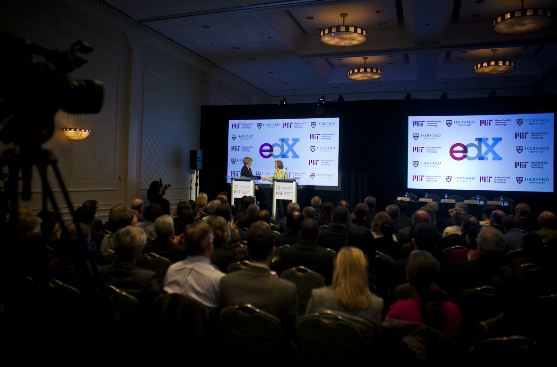UC Berkeley joins edX
July 25, 2012
EdX, the online learning initiative founded by Harvard University and the Massachusetts Institute of Technology (MIT) and launched in May, announced today the addition of the University of California, Berkeley to its platform.
UC Berkeley will offer two courses on edX this Fall — on AI and software — and the university will also serve as the inaugural chair of the to-be-formed “X University” Consortium.
EdX plans to add other “X Universities” from around the world to the edX platform in the coming months.
The classes to be offered on edX this fall are:
- HarvardX — “Health in Numbers: Quantitative Methods in Clinical and Public Health Research” is a course in Biostatistics and Epidemiology focused on teaching a diversity of health care practitioners and other students from around the world how to design rigorous clinical and public health studies and analyze complex health data, thereby furthering the school’s mission of improving global health. The course is taught by Professors E. Francis Cook and Marcello Pagano. Dr. Cook is a Professor of Epidemiology at the Harvard School of Public Health (HSPH) and at the Harvard Medical School and he has won citations for Excellence in Teaching from the Harvard School of Public Health on four occasions. Dr. Pagano obtained a Ph.D. from Johns Hopkins University and has spent the last 35 years on the faculty at HSPH teaching biostatistics and advising students.
- HarvardX — “Computer Science 50” (CS 50) is Harvard College’s introduction to the intellectual enterprises of computer science and the art of programming for majors and non-majors alike. An entry-level course, CS50 teaches students how to think algorithmically and solve problems efficiently. Topics include abstraction, data structures, memory management and security. Languages include C, PHP and JavaScript. The course is designed for students with or without prior programming experience. As of Fall 2011, CS50 was Harvard College’s third-largest course. It is taught by Harvard Senior Lecturer David J. Malan. He received his A.B., S.M. and Ph.D. in Computer Science from Harvard in 1999, 2004 and 2007, respectively.
- MITx — “Introduction to Computer Science and Programming” provides an understanding of computational approaches to scientific problem solving for students with little or no prior programming experience. It is based on the most popular course on MIT’s OpenCourseWare platform and provides a tour of the major features of the Python programming language and object-oriented programming, algorithmic design and analysis and computational approaches to generating and understanding data, with examples drawn largely from the sciences and social sciences. The principal instructors for the course are John Guttag, W. Eric Grimson, and Chris Terman. John Guttag is the Dugald C. Jackson Professor of Computer Science and Electrical Engineering at MIT, and currently heads the Computer Science and Artificial Intelligence Laboratory’s Data-driven Medical Research Group. Christopher J. Terman has taught computer science courses in the EECS department for many years; his research has been in the areas of programming languages, compilers, computer-aided design tools and educational technologies. W. Eric Grimson is the Bernard Gordon Professor of Medical Engineering and Chancellor of MIT.
- MITx — “Introduction to Solid State Chemistry” is a first-year college course where chemical principles are explained by examination of the properties of materials. The electronic structure and chemical bonding of materials is related to applications and engineering systems throughout the course. The on-campus version of the course has been taught for more than 40 years and is one of the largest classes at MIT. The instructor for the course is MIT Professor of Materials Science and Engineering Michael J. Cima. Cima is author or co-author of more than 200 peer-reviewed scientific publications and 45 patents.
- MITx — “Circuits and Electronics” is an introductory undergraduate electrical engineering course taught by visiting MIT Associate Professor Khurram K. Afridi and developed by edX president MIT Professor Anant Agarwal, MIT Professor Gerald J. Sussman, MIT Senior Lecturer Christopher J. Terman and edX Chief Scientist Piotr Mitros.
- BerkeleyX — “Artificial Intelligence” is a course in the basic ideas and techniques underlying the design of intelligent computer systems, with a specific emphasis on the statistical and decision-theoretic modeling paradigm. By the end of this course, students will have built autonomous agents that reason in uncertain environments and will have developed machine learning algorithms that will classify handwritten digits and photographs. The on-campus version of the course is one of the most popular computer science courses at UC Berkeley. It will be taught by UC Berkeley Assistant Professor Pieter Abbeel and Associate Professor Dan Klein, a recent recipient of the Distinguished Teaching Award, UC Berkeley’s highest teaching honor.
- BerkeleyX — “Software as a Service” teaches the fundamentals for engineering long-lived software using highly-productive agile techniques to develop Software as a Service (SaaS) using Ruby on Rails. The topics include test-driven development, behavior-driven/user-centric design, design patterns, legacy code, refactoring and deployment. It will be taught by UC Berkeley Adjunct Associate Professor Armando Fox, who has received teaching and mentoring awards from Stanford University, the Society of Women Engineers and Tau Beta Pi Honor Society, and Professor David A. Patterson, winner of the ACM Karl Karlstrom Teaching Award and the IEEE Mulligan Medal in Education.
For this introductory set of courses, certificates of mastery will be available at no charge for each of the courses to those learners motivated and able to demonstrate their knowledge of the course material.
